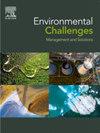美洲地区碳排放的经济和贸易决定因素
Q2 Environmental Science
引用次数: 0
摘要
在过去几十年里,平衡经济增长与可持续发展一直是一项重大挑战,这主要是由于碳排放造成的环境破坏。本研究考察了2000 - 2022年美洲地区28个国家的能源消费、国内生产总值(GDP)和贸易开放度之间的关系及其对碳排放的影响。利用多元线性回归模型进行国家层面分析,研究结果揭示了该地区的不同趋势。例如,安提瓜和巴布达、玻利维亚、巴西、智利和危地马拉等国的经济增长与碳排放增加之间存在密切联系。相比之下,美国和加拿大等发达国家显示出GDP增长与排放脱钩的迹象,这支持了环境库兹涅茨曲线假设,该假设表明,较高的收入水平会导致环境退化减少。该研究强调了在促进可持续经济增长的同时,制定针对具体国家的减排战略的重要性。全面了解国内生产总值、能源消耗、贸易开放和碳排放之间的复杂关系,将使决策者能够制定平衡生态可持续性与社会经济目标的战略。本文章由计算机程序翻译,如有差异,请以英文原文为准。

Economic and trade determinants of carbon emissions in the American region
Balancing economic growth with sustainability has been a significant challenge over the past decades, largely due to the environmental damage caused by carbon emissions. This study investigates the relationship between energy consumption, gross domestic product (GDP), and trade openness and their impact on carbon emissions in 28 countries in the American region from 2000 to 2022. Using a multiple linear regression model for country-level analysis, the findings reveal diverse trends across the region. For instance, countries such as Antigua and Barbuda, Bolivia, Brazil, Chile, and Guatemala demonstrate a strong link between economic growth and increased carbon emissions. In contrast, developed nations such as the United States and Canada show signs of decoupling GDP growth from emissions, supporting the Environmental Kuznets Curve hypothesis, which suggests that higher income levels lead to reduced environmental degradation. The study highlights the importance of tailored, country-specific strategies to reduce emissions while promoting sustainable economic growth. A thorough understanding of the complex relationships between gross domestic product, energy consumption, trade openness, and carbon emissions will enable policymakers to devise strategies that balance ecological sustainability with socio-economic objectives.
求助全文
通过发布文献求助,成功后即可免费获取论文全文。
去求助
来源期刊

Environmental Challenges
Environmental Science-Environmental Engineering
CiteScore
8.00
自引率
0.00%
发文量
249
审稿时长
8 weeks
 求助内容:
求助内容: 应助结果提醒方式:
应助结果提醒方式:


